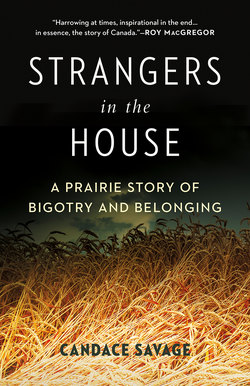Читать книгу Strangers in the House - Candace Savage - Страница 6
На сайте Литреса книга снята с продажи.
ОглавлениеPREFACE
DURING THE YEARS when this book was in the making, I often found myself called upon to describe it to friends. “I’m tracing the first people to live in my house, back in the 1920s,” I’d explain. “Here in Saskatoon. They came from deep roots in French Canada. Napoléon Sureau dit Blondin and his wife, Clarissa Marie Parent.” I’d let the syllables roll off my tongue in my most musical accent, a small flourish that never failed to give me pleasure.
“But your own name,” one of those friends objected. “Savage. That doesn’t sound very French. I know you live in the same house they once did, but do you inhabit their story? I mean, really, do you have skin in the game?”
I offered some kind of an answer and the talk turned to other things, but her question echoed in my thoughts for days. There I was, daring to represent the experience of people who had died before I was born and whose background was, in notable ways, different from my own. Apart from the coincidence of sequential cohabitation, what gave me a right—or even a reason—to delve into their story? It was a valid question and one worthy of consideration.
That exotic-sounding name, Sureau dit Blondin, was the most obvious sign of the distance between my subjects and me. Although I’d become a Savage through marriage, I was a Sherk at birth—not wholly of English heritage, as my acquired last name suggests, but not French either. The Blondins, by contrast, were French root and branch, and their history is marked by the struggle to survive with dignity on a continent dominated by an aggressive Anglo majority. My ancestors didn’t experience the shock of the British Conquest or of la guerre des Patriotes. They didn’t suffer through the economic collapse that sent nearly a million Québécois into the mill towns of nineteenth-century New England. Simply because they were French Canadians, the Blondins were implicated in these crises in ways that my own people were not. And yet, I do have a stake in these traumas, which left their mark on an entire continent, including the nation that I call home. They are among our foundational stories and belong to us all.
As my engagement with the Blondins deepened, I found myself swept up in a multigenerational saga that reached from the hill country of western France to the plains of Saskatchewan, and from the days of wooden sailing ships to the present. In its details, this narrative was unique, studded with individuals and enlivened by personal decisions. In its broad outline, however, the family’s experiences read like a case study in the process of North American settlement. Along with millions of others, the ancestral Blondins were human motes caught in the flood of European colonial expansion. By the early twentieth century, that impulse had carried one branch of the family to the Last Best West of the Canadian prairies, where they unwittingly crossed paths with my own venturing grandparents. Dispersed onto square plots of land, the Blondins, the Sherks, and millions more like them struggled to put down roots, to gain a sense of inclusion and belonging.
Before I embarked on this research, I had no idea how fraught that settling-in effort had been. During my sixteen years of schooling, no one had ever told me about the obnoxious and ubiquitous presence of the Orange Order in English Canada. No one had mentioned the brief but revelatory flowering of the Ku Klux Klan in Saskatchewan or its mission to assert the ascendancy of white, Anglo-Saxon Protestants. Although that outburst of bigotry had waxed and waned by the 1930s, the smoke of burning crosses hung in the air for years. Half a century later, I would succumb to the temptation of adopting an Anglo surname to escape the lingering embarrassment of being “ethnic.”
Do I have skin in this game? Yes, and I’m willing to guess that you do, too. The story of the Blondin family is fascinating and intensely human; it is valuable in itself. But it also opens up a window, a new perspective on the past, revealing truths that lie, half-forgotten, in the darkness.
